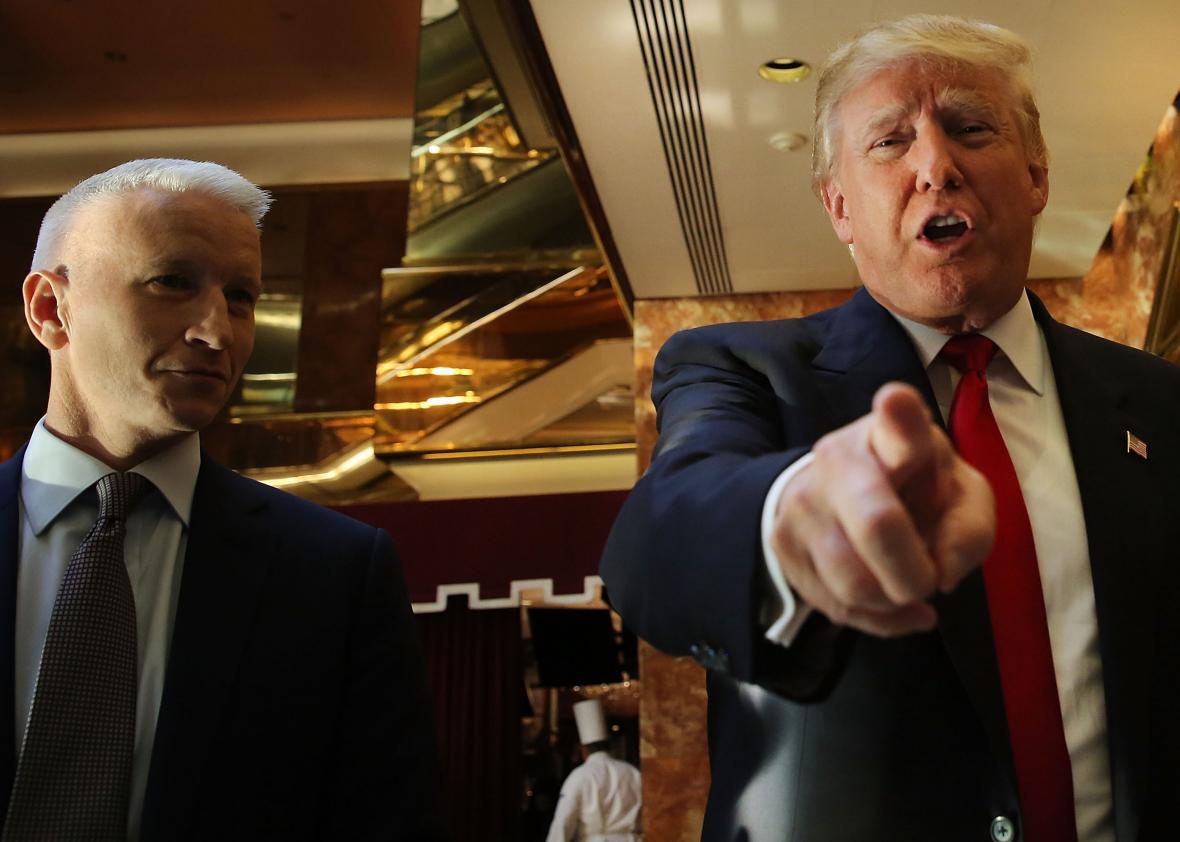On Tuesday night, one of our two major political parties was captured—or rather consumed—by a bigoted quasi-fascist and fraud, a dangerously unstable demagogue. The consequences for America and the world—if he wins, of course, but maybe even if he loses—are unknowable and perhaps unimaginable. The degree to which, by changing the Republican Party, he will also permanently deform American politics can only be speculated upon, but his primary victory will, decades from now, likely be seen as one of the defining events of 21st-century America.
And yet when people look back at Tuesday night’s results a generation from now, our larger cultural response—at least as seen through our television media—will seem incomprehensible. On TV Tuesday night, there was hardly a whimper. CNN, MSNBC, and Fox contented themselves with bright chatter about Ted Cruz’s hurt feelings, about Donald Trump’s political skill, about the feckless, pathetic Republican establishment. None of the commentators I saw mentioned the import of what was happening. Large chunks of the media have spent so long domesticating Trump that his victory no longer appeared momentous. He is the new normal.
“We will be listening very closely to the tone Trump and Cruz take,” Wolf Blitzer told his audience, as we waited for the two men—the triumphant winner and the insincere loser—to speak to their respective supporters. “The fact is, he tapped into a zeitgeist,” David Axelrod said. “Donald Trump has a phenomenal sense of his audience.” “It’s stunning, and it’s historic,” Gloria Borger finally said on CNN. But she didn’t mention anything stunning or historic, merely noting Trump’s ability to “tap into something.” It was as if CNN had decided to cover 9/11 as a story about real estate in Lower Manhattan.
On MSNBC and Fox, the talk was similar. Would Trump debate Clinton? Could he win over female voters? By the time Cruz announced, less than two hours after the polls had closed in Indiana, that he was dropping out of the race, it had begun to seem like something out of a dream. This was really happening. But television’s acknowledgment that this indeed was happening did not affect anyone’s analysis of what “this” was. There was little talk of ideology, or racism, or bigotry, or fascist appeals. Instead, the conversation was about process; Trump had been fit into the usual rhythms of an election season. The closest thing I heard to open-mouthed shock came from Rachel Maddow, who wondered, correctly, why out of 330 million people the Republican Party had chosen this particular reality-television star.
The Republican Party is now a white nationalist party, or at least a party with a white nationalist as its figurehead. The one attribute of our politics that used to make it slightly more palatable than much of European politics is no more. We’ve had our Dick Cheney and our Donald Rumsfeld and even our Richard Nixon. But we could always take pride in the way our redoubtable two-party system prevented quasi-fascists from getting close to real power. We’ve never had someone so untethered both from reality and from any sort of institutional check or balance come so close to the most powerful office on Earth.
Trump finally emerged at 9 p.m. to make a brief victory speech, but he didn’t really say much, and he certainly didn’t do anything to mark the moment. Back in the CNN studio, Anderson Cooper was talking to several network contributors. Was Cooper wondering, even for a second, what it meant that the man over whom he had fawned for so long was perhaps now going to be president? Did he care? Pretty soon the panel’s discussion turned to Hillary Clinton’s strategy, and the upcoming horse race. They could have been talking about any election.
